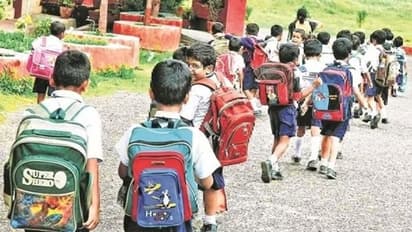Noida schools shut physical classes after AQI hits hazardous levels; GRAP-4 enforced

Synopsis
The district administration cited the findings of the Commission for Air Quality Management (CAQM) in the National Capital Region and adjoining areas, which invoked Stage IV of the Graded Response Action Plan (GRAP) to address the deteriorating air quality.
Amid alarming pollution levels in the Delhi-NCR region, Gautam Buddha Nagar District Magistrate Manish Kumar Verma onordered the closure of physical classes for students up to Class 12 until November 23. The decision comes as the Air Quality Index (AQI) in Delhi breached the 450 mark, placing it in the 'severe plus' category.
The district administration cited the findings of the Commission for Air Quality Management (CAQM) in the National Capital Region and adjoining areas, which invoked Stage IV of the Graded Response Action Plan (GRAP) to address the deteriorating air quality.
'Extremely worrisome': Supriya Sule, Arvind Kejriwal, Chadha condemn attack on Anil Deshmukh (WATCH)
"In view of the current air pollution levels, all schools in the district are directed to shift to online mode for students from pre-school to Class 12 until November 23," the district magistrate said in the order.
An AQI between 401 and 450 is categorised as 'severe,' while anything above 450 is deemed 'severe plus.' Prolonged exposure to such hazardous air can severely impact health, especially among vulnerable groups such as children, the elderly, and those with pre-existing medical conditions.
Delhi's hazardous air quality was a focal point at COP29, where experts raised concerns over the public health crisis. Aarti Khosla, Director of Climate Trends, emphasized that particulate pollution in some parts of Delhi had reached over 1,000 micrograms per cubic meter. She identified multiple contributors to the pollution, including black carbon, ozone, fossil fuel combustion, and stubble burning, calling for an integrated approach to tackle the crisis.
In response to the deteriorating conditions, educational institutions across the region have adapted to online classes. Delhi University announced a shift to virtual learning until November 23, while Jawaharlal Nehru University (JNU) has extended online classes until November 22.
The persistent smog and poor visibility have also reignited discussions about long-term solutions, including stricter regulations on industrial emissions, sustainable agricultural practices, and improved urban planning.
Stay updated with the Breaking News Today and Latest News from across India and around the world. Get real-time updates, in-depth analysis, and comprehensive coverage of India News, World News, Indian Defence News, Kerala News, and Karnataka News. From politics to current affairs, follow every major story as it unfolds. Get real-time updates from IMD on major cities weather forecasts, including Rain alerts, Cyclone warnings, and temperature trends. Download the Asianet News Official App from the Android Play Store and iPhone App Store for accurate and timely news updates anytime, anywhere.